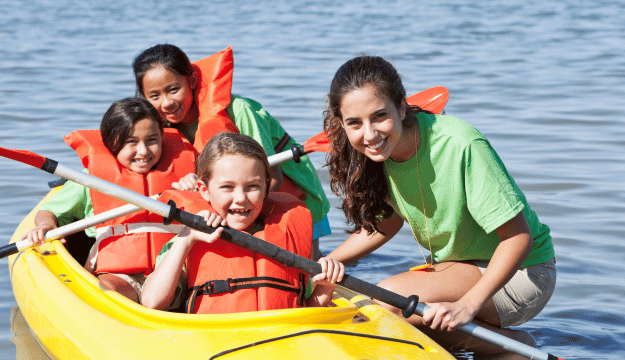Day camps in summer are the perfect place for kids to learn new skills, develop new interests, and meet new acquaintances. There isn’t a universally-fit-all camp. To determine the best school for your child’s needs, take a look at these suggestions.
1: Know Your Child
Discuss the issue and narrow down the possibilities according to your child’s interests and preferences. Discover what he would like from this experience and create a list of activities that he would like to do. Consider his developmental needs. Are they capable of a full-time program? Would he feel more at ease in a small versus large crowd? If your child is into athletics but has displayed an enthusiasm for drama or art and other subjects, encourage him to step outside of his familiar zone. It could spark an interest that will grow.
2: Gather Information
Participate in fairs for campers and peruse San Diego Family magazine’s summer camp guide. Take note of the programs you like and shop around. Contact the camp of your choice to ask questions about their philosophy or the schedule for daily activities, as well as other important topics to you. Make the effort to do this upfront and you could discover a camp that you want to remain with for a long time.
3: Traditional or Specialty
If you are deciding between a traditional or a specialty program, you should consider this general rule of thumb The smaller children are, the more diverse the programs will be. Children betweenthe ages of 7 and 11 do well in a space that allows them to explore many different topics. As they grow more attentive, it is possible that they will concentrate on one thing. If you opt for a specialization camp, determine how challenging the program is. It could be labelled “specialty” but only have an hour or two element with other activities scheduled within.
4: Look at Location
Find a camp near your workplace or home to cut down on travel time and also allow for the child to be quickly reached in the event of an emergency. However, convenience isn’t the only consideration. Be sure to consider the benefits that the camp has to offer. If your child is really keen to be a part of a certain camp, be prepared to travel out of the way. Consider if you have someone nearby you could ride with.
5: Ponder Program Length
The length of your program should be evaluated as a function of the children’s and the family’s needs. If you have a schedule that requires the child’s stay to be all day, ask after-care or before-school. If your child is young, you should inquire about nap times or quiet time. It’s also crucial to know who manages the after-care program. Are they the same people that your child is with all day? What are the activities he will be taking part in during this period?
6: Scout Out Schedules
Before you enroll, be sure to inquire about the schedule for the day. What topics and activities are scheduled? Are there excursions or special guests that will keep your campers entertained and enhance the learning theme? Are your children receiving any math, reading, or writing training or instruction? If done correctly, kids will take part in games and activities to keep their abilities in the classroom sharp. Take a look at the amenities and programs the camp offers, and ask whether your child is likely to be involved in these activities. Don’t believe that just the fact that there’s a swimming pool, ropes course, or archery range on the brochure makes it the focus of your child’s day. Make sure to confirm.
7: Ask About Staff
Learn the process by which counselors and staff are selected, as well as their experience, background, age, and education, and the ratio of counselors to campers. According to the American Camping Association’s day-camp suggestions, they are 1:6 for kids aged 4–5, 1:18 for children ages 6–8, 1:10 for those aged 9–14, and 1:12 for those aged 15–18. Be sure to inquire about what screening procedures are used for counselors and the type of background checks that are conducted. If you’re considering an exclusive camp, what sort of expertise and experience do counselors have in teaching the particular subject?
8: Consider Costs
Compare the costs of programs and discover what the costs actually cover. Certain camps offer field trips and supplies such as meals, T-shirts and meals in their own cost, while for others, these are extras. Be sure to inquire about the policy on refunds and the rules for transferring weeks in the event that you change your plans or your child is sick. If the camp is outside of your budget, Are scholarships or financial aid offered?
9: Explore Open Houses
A visit to an open house could help children become accustomed to the surrounding and offer an insight into the facilities, staff and activities. Do the employees appear happy and pleasant? Are they able to immediately connect with children? Are the facilities maintained and clean? And are they free of dangers to safety?
10: Peruse Policies
Make sure you are familiar with the rules and regulations of the camp prior to enrolling. You don’t want to discover later that there’s a no-cell phone policy or that the pickup and drop-off policies are different from what you were expecting. Be sure to share relevant information with your child to ensure that you don’t have any surprises on his part.

